In the 20-odd years that I’ve been a professional writer and editor now (and they have been odd years, I can tell you) I’ve seen pretty much every example of bad writing in the book. Sometimes the bad writing was mine – sometimes it was work done by a writer I’d commissioned – but either way it has generally been my job to clean it up: to turn bad writing into adequate copy, or even better – into sparkling prose.
Along the way I’ve picked up lots of little tips and guidelines that help me do that. These are those – and I hope you find them useful in improving your own writing – be that business blogs or long-form fiction. So here we go.
But wait, what is good writing?
Ah, good question. Over the years I have developed a philosophy of good writing that is probably a little contentious. In my view good writing is simply the absence of bad writing.
What does that mean? It means that once you have removed all the bad stuff from a piece of writing, what is left is fantastic prose. That may sound unromantic, but in my professional opinion it’s good news. It means that anyone can be a great writer, simply by knowing what to not do. Which is why blog posts like this are genuinely useful – because they provide lists of dos and don’ts that anyone can follow. Essentially what I’m saying is there’s no secret sauce, no magical writer’s skill – it’s something anyone can do.
So let’s get on with it.
Write like you’re telling your friend a story in a bar
Now, I don’t know what your friends are like, but mine are impatient – a fairly smart bunch and they like to be entertained – but they’re impatient. So if I’m meeting a few of them for a catch up and I want to tell them an anecdote – maybe about some absurd or amusing episode that’s happened since we last saw each other – I know that I’ve got about a minute to snag their attention before they change the subject out of boredom.
And that’s a generous amount of time, because they know me. Whereas if you’re writing for an audience of strangers then you probably have a lot less time to signal to your readers that you are worth their time.
The lesson here? Start strong, and keep delivering the goods at regular intervals to keep your reader engaged. Readers are impatient and you need to get to your point – or at least tease that you have a point worth waiting for – right at the start of whatever you’re writing.
Write in your own voice – as in, your speaking voice
This is another lesson that comes out of the ‘write like you’re in a bar’ advice. Basically, it’s really important that you write in a voice that is natural to you – and if you’re struggling to know what your ‘writing voice’ might be like, then you should imagine yourself telling your tale (or relating your blog, or whitepaper, or research-paper) to a friend in a relaxed setting (e.g. a bar, a coffee shop – on the phone even, if that works for you).
The point here is that your natural speaking voice is perfectly adequate to use as a writing voice. What does that mean in practice? Probably using shorter sentences (like this one). And shorter words too. Because if you wouldn’t feel natural using a word like ‘contemporaneous’ in person, you’ll certainly sound like a pompous git using in when you write.
Why is that, by the way? Well, I reckon a lot of people think of writing as something special – fancy, intellectual, or refined. So when they sit down to write they do the mental equivalent of putting on their Sunday best clothes – and come across as stiff and uncomfortable as they would feel in that outfit. So if you want to write well, do yourself – and your readers – a big favour and just write ‘smart casual’ instead of ‘back tie’. Or in other words – as if you’re telling a story to a friend.
Don’t write ‘straw man’ sentences
What I call ‘straw man’ writing is where you set up a sentence with some lame thing, just so you can knock it down it with your main point. Here are some examples:
“While a lot has changed in New Zealand rugby, one thing has stayed the same: our passion for the game is strong.”
“While some people believe Britain’s exit from the EU is a non-event, those in the know are aware of just how much impact this decision will have.”
Hopefully it’s clear to you that the first part of each of those sentences is absolute fluff – completely useless information put there to give the writer a sort of run up to what their actual point is. Now look at how much more impactful the sentences are if you just delete the first, straw man, part:
“Kiwis are passionate rugby fans.”
“Britain’s exit from the EU will have a big impact.”
The lesson here? Stop the waffle. Just work out what your point is, then make it.
Ugly words are better
Something I teach my writers is that ugly words are your friend. Short words with hard, guttural sounds – those with Zs, Ks, Ds etc – are better at snagging attention and delivering impact than their softer cousins. In English we typically have at least two synonyms available for any given word, one Germanic or from Old English, and another ‘romance language’ (French or Latin) version. As a rule of thumb: for impact, the ugly English/Germanic version is the one you want! So you can write ‘get’ instead of ‘receive’, ‘cut’ instead of ‘sever’, ‘shrink’ instead of ‘reduce’ – etc. Got it? (which is punchier than asking ‘do you understand?’)
Use one point per paragraph
Have you ever found that you just can’t make a paragraph work – that no matter how you shape it you get lost in a tangle? It might be that you’re trying to explain more than one point in your paragraph.
If so, try teasing the info out over more paragraphs. It’s often worth doing this in an outline before you start, giving each paragraph a single bullet-point. Here’s a made-up example for a blog:
Tangled article outline:
- New Zealand has used dodgy Chinese steel, China is threatening a trade ban if New Zealand complains about it, and New Zealand’s opposition politicians are making political capital out of the conflict
- NZ dollar vs US dollar rate has been affected
Clearer article outline:
- New Zealand has used dodgy Chinese steel.
- China is threatening a trade ban if New Zealand complains about it
New Zealand’s opposition politicians are making political capital out of the conflict[decided to not mention this – I see now it would bog the article down]- NZ dollar vs US dollar rate has been affected
A tip for novelists about meter
Here’s some advice for fiction writers that relates to meter – i.e. the rhythm or musicality of your words. It’s about that time when you’re in mid-flow writing and you need to introduce a new character – BUT you don’t know their name just yet, so you throw in a placeholder. And this is fine – I’ll often use abbreviations like NC (new character) and go in to replace the name once I settle on it with a simple find/change in MS Word. But here’s the tip: you MUST choose the number of syllables right from the start. Otherwise when you do your find/change on the manuscript, the new name will mess with all your beats and clag your sentences. So “NC” can become “Katie” but NOT “Annabelle”. Capiche?
If you’re writing fiction, let the reader have some fun
Some of the oldest writing advice that I follow comes from a book called Tristram Shandy, written in 1759. In a book, half of the job belongs to the writer, says the main character in Tristram Shandy, and the rest of the job of making the novel falls to the reader.
In short, you gotta leave some gaps. A novel is satisfying to read when you get to fill in the spaces with your own imagination – and smart writers leave some of the creative fun up to the reader. Practically speaking that means you don’t need to describe every character’s exact eye colour, face shape, or tone of voice. Set the scene well enough and the reader will fill those details for themselves, and enjoy the process all the more for getting to do that.
Active voice versus passive voice
You should always strive to write as directly as possible, about things that feel concrete and immediate. A key rule here is to use the active voice, not the passive voice. For example, this is good:
“The man ate the sushi”
And this is bad:
“Sushi was eaten by the man.”
Writers who have been to university or college are often trained to write in the passive voice, because academics think it sounds more objective and therefore more reputable. However any writer worth their salt knows that the passive voice simply kills a reader’s engagement, and should be avoided.
A good piece of advice when monitoring your own (or others’) writing for the passive voice is to look out for the word ‘to’ — because we often use ‘to’ when constructing a passive verb phrase. So keep an eye out for ‘to’ and swap it into an active version of the verb to make your writing more direct. For example:
“When it comes time to protect your property it’s best to seek professional advice.”
Is much better like this:
“Protect your property by seeking professional advice.”
Actually, let’s make that punchier still by replacing the namby-pamby word “seeking” with the ugly, short (and therefore more effective) “get” as per the point above about ugly words. Hell, while we’re at it let’s rephrase the whole thing into a ‘problem-solution’ format:
“Need to protect your property? Get professional advice.”
Better right?
Brevity
You can always, always, always make your point more effectively better by using with fewer words.
Get in the habit of looking at what you’ve written to work out what can be rephrased to make it shorter. In his autobiography C.S. Lewis told how at Cambridge his tutor would set him an essay topic – of say 1200 words. He’d stay up all night writing it, then hand it in, and his tutor would say ‘Very good. Now cut it in half.’ So he’d labour to cut the word count while retaining all the same information, hand in the 600 words, to be told ‘very good – now cut it in half again’. In would go his 300 words, and he’d be told to make it 150…
You get the point – and so did C.S Lewis.
The lesson here? Most long articles make better short articles; most short articles are better as a punchy par – and plenty of punchy paragraphs serve your reader better as a bullet point.
Not always of course, but if you get in the habit of paring your work down mercilessly you will slowly but surely evolve into the kind of writer who produces content readers just can’t tear their eyes from.
Poss crime
A poss crime – or apostrophe crime – is when a writer uses what’s known as the grocer’s apostrophe (cabbage’s, cauliflower’s, etc), or makes any of the many other mistakes that can be made with pluralisation and / or the possessive ‘s’. Getting this stuff right is your stock in trade. If you still feel unsure about the correct way to use apostrophes there are a billion tutorials online: read up online until it becomes second nature.
We all trip up on these from time to time, but to be a good writer – and a good editor – you must know how to correctly use apostrophes. For that matter you also need to know the difference between:
- There, their, they’re
- Its / it’s
- To / too / two
- Affected / effected
- Bare / bear / beer
- Stationery / stationary
- Complementary / complimentary
- Pouring / poring
- Practice / practise
And so on.
Signposting
Signposting is a technique for guiding your reader through an article – and it’s a very handy tool for you to develop. It simply means pausing in an article just as it’s getting confusing to explain what’s going on. It’s up to you how you do it, but here are some examples.
“So why is this important? Well, as we saw earlier, XYZ facts mean..”
“Confused? Don’t worry – that’s an appropriate response to what is a tangled situation. Let’s break it down into XYZ…”
There are a million ways to do this sort of thing, but what it boils down to is this: you’re the boss; the reader is in your hands. Use your skills to make their experience a good one.
Mass nouns versus count nouns
Why do we talk about ‘fewer people’, but not ‘fewer milk’?
Because you can count people, but you can’t count milk – it’s a continuous mass. So we say:
- Less milk
- Less sand
- Less money
But,
- Fewer bottles of milk
- Fewer grains of sand
- Fewer coins
Using the wrong word to describe a noun makes you look bad to your reader. If you catch yourself writing “Less people are using Microsoft Office”, change it to “fewer”, and pat yourself on the back for knowing why.
The mis-related clause
This is when the parts of your sentence don’t match. For example:
“With a personal fortune of $600 million, and a family line stretching back to the Middle Ages, the Queen arrived at Auckland airport.”
The first part doesn’t really belong in the same sentence as the second part, right? In practice we allow journalists to use misrelated clauses sometimes, simply because they’re such a useful way of cramming extra information into sentences. They only become a problem when they make your statements absurd. E.g.
“With ten palaces, and a fleet of luxury vehicles, the Queen arrived at Auckland airport.” (whoah – she really must have blown her 20kg luggage allowance….)
Good writers just need to be aware of what misrelated clauses are, and keep an eye on them.
Finally, some words and phrases to watch out for
- “It goes without saying”
If it goes without saying, don’t say it! Similarly look at phrases such as ‘obviously’, and ‘needless-to-say’ with suspicion. Stating the obvious isn’t valuable for your reader.
- “Up”
A hugely overused word. Match up, smash up, tune up can simply be match, smash, tune
- “Along with”
Try to avoid this phrase. Could you just say ‘with’?
- “Literally”
Is the opposite of figuratively. If something “literally happened”, it really just “happened”, and doesn’t need the word ‘literally’. E.g. “She was literally the tallest person in the room” should be “She was the tallest person in the room.”
Correctly used, the word ‘literally’ clarifies a sentence that might have otherwise been taken for a figure of speech.
“The Ingham twins literally jumped ship” [these people didn’t just leave somewhere without giving notice – they leapt from a boat and got wet.]
“When in Perth you should stop to smell the roses – literally.” [We’re not saying you should take life slowly when visiting Perth, we’re going to tell you about how you should visit the rose gardens to smell the blooms there]
The most common – and absurd – mistake made with the word literally is when a writer mistakenly uses it for emphasis. E.g:
“She literally chewed his head off in front of the whole team!”
Unless you mean that a grisly crime has been committed in front of many witnesses, then you need to rephrase this sentence.
What does that all look like in practice?
If you want to see what all the above advice on word choice, writing voice, immediacy, structure and style all looks like in the real world, then jump to this page, hit the “Look Inside” link on one of my novels and read the first sentence. A novel’s first sentence, paragraph and page is the place where all of your writing skills must be distilled and deployed – no wonder writing this critical part of a book brings on such anxiety. But if you absorb the right advice, hone your technique and persevere, you’ll begin to write more naturally, with more confidence – and in a way that hooks your readers from the start.


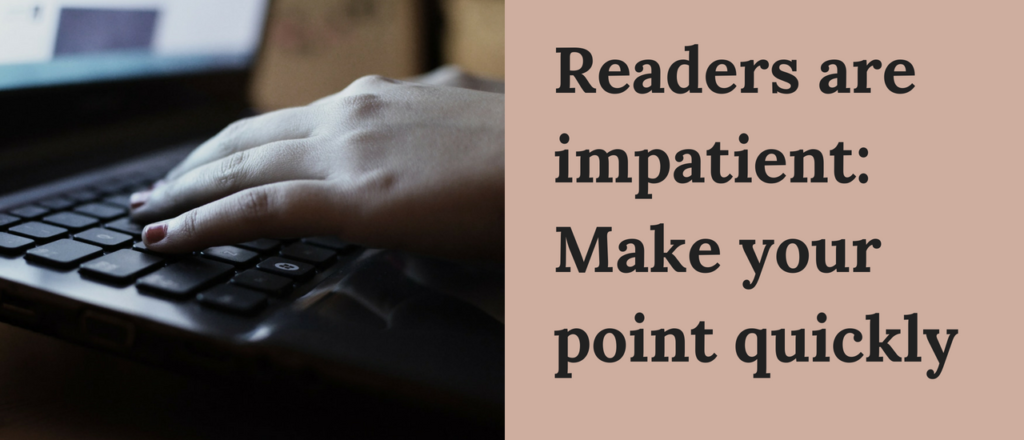
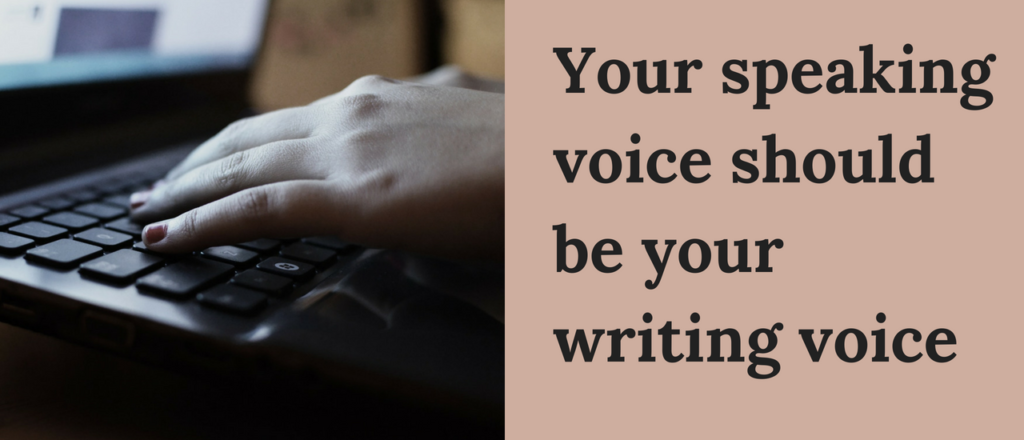
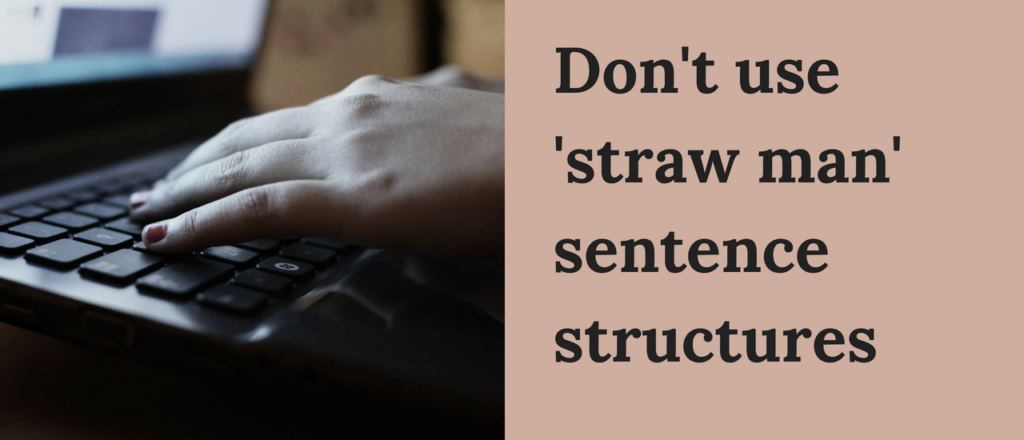


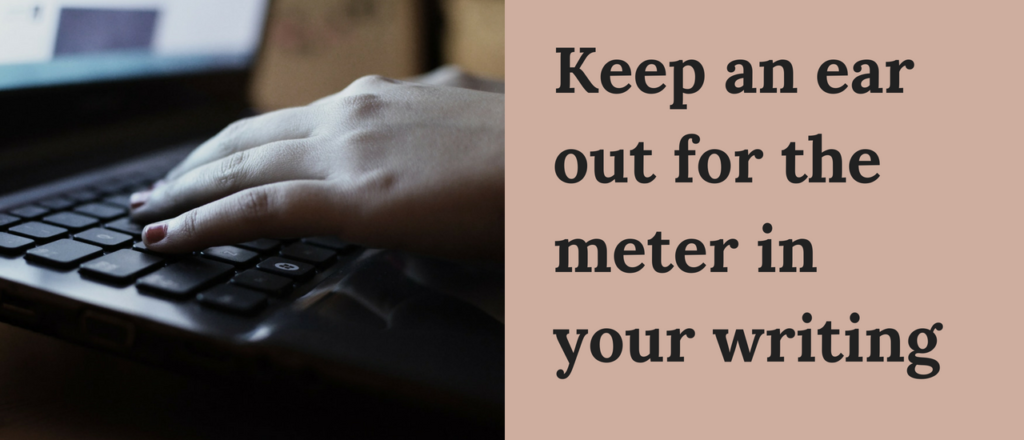

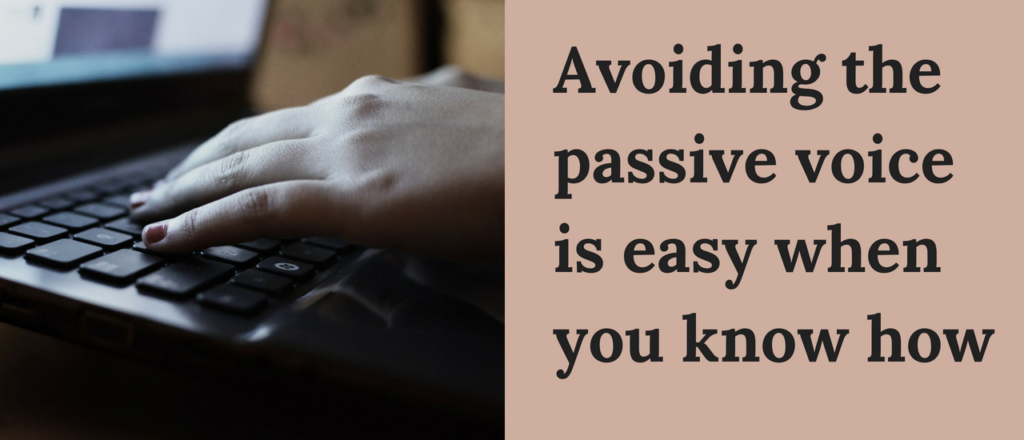









Merci pour ces conseils qui éclairent ma route d’écrivaine. Je suis à écrire mon deuxième tome et c’est vrai que les premières phrases sont cruciales et me causent un peu d’anxiété.
Thank you to you for these tips that enlighten my writing journey. I just started to write my second volume and I agree with you that the first sentences are crucial and cause me some anxiety !!